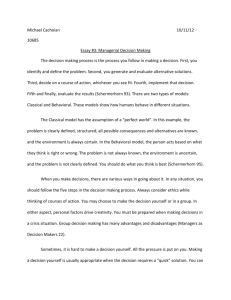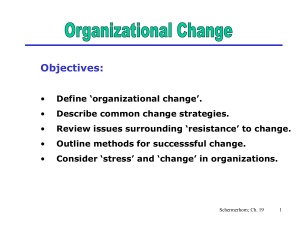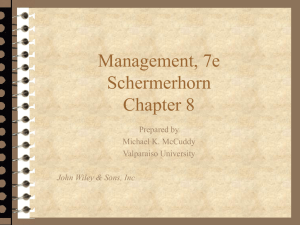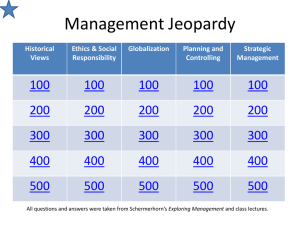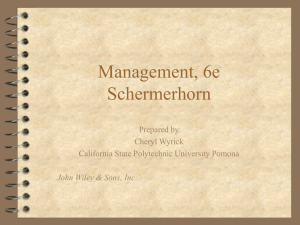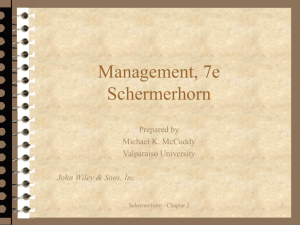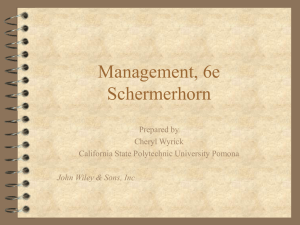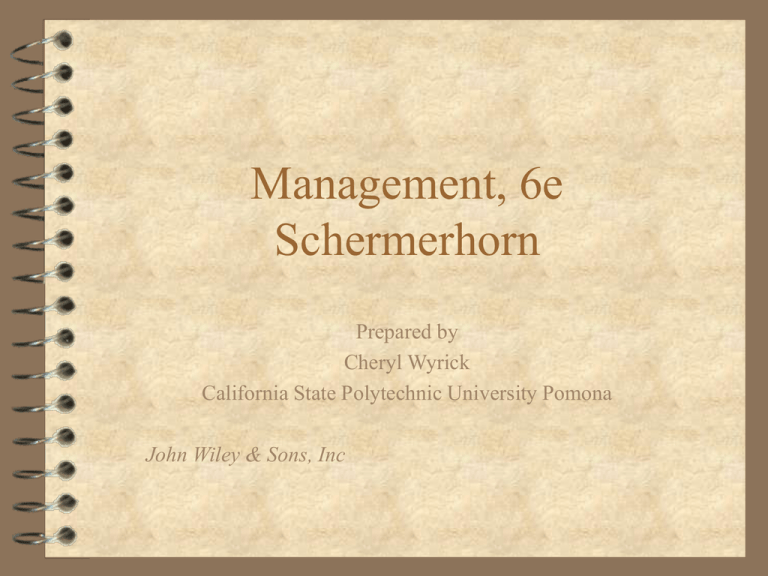
Management, 6e
Schermerhorn
Prepared by
Cheryl Wyrick
California State Polytechnic University Pomona
John Wiley & Sons, Inc
COPYRIGHT
Copyright 1999 © John Wiley & Sons, Inc. All rights reserved.
Reproduction or translation of this work beyond that named in
Section 117 of the United States Copyright Act without the express
written consent of the copyright owner is unlawful. Request for
further information should be addressed to the Permission
Department, John Wiley & Sons, Inc. The purchaser may make
back-up copies for his/her owner use only and not for distribution or
resale. The Publisher assumes no responsibility for errors,
omissions, or damages, cause by the use of these programs or from
the use of the information contained herein.
Chapter 9
Controlling to Ensure Results
Planning Ahead
– What is the control process?
– What types of controls are used in
organizations?
– How do organizational systems assist in
control?
– How can operations management improve
control?
Schermerhorn - Chapter 9
3
Controlling as a Management
Function
Steps in the Control Process
– Establish objectives and standards
– Measure actual performance
– Compare results with objectives and standards
– Take corrective action as needed
Schermerhorn - Chapter 9
4
Controlling as a Management
Function
Step 1: Establishing Objectives and
Standards
– Types of Standards
• output
– measure results in terms of performance criteria
• input
– measure effort in terms of amount of work
Schermerhorn - Chapter 9
5
Controlling as a Management
Function
Step2: Measuring
Actual Performance
– goal is accurate
measurement of output
and/or input standards
Schermerhorn - Chapter 9
6
Controlling as a Management
Function
Step 3: Comparing Results with Objectives
and Standards
Need for action x desired performance - actual
performance
Schermerhorn - Chapter 9
7
Controlling as a Management
Function
Comparing Results with Objectives and
Standards
– Historical Comparison
– Relative Comparison
– Engineering Comparison
Schermerhorn - Chapter 9
8
Controlling as a Management
Function
Step 4: Taking Corrective Action
– Management by exception
• problem situation
• opportunity situation
Schermerhorn - Chapter 9
9
Controlling as a Management
Function
Characteristics of Effective Controls
–
–
–
–
–
–
–
strategic and results oriented
understandable
encourage self-control
timely and exception oriented
positive in nature
fair and objective
flexible
Schermerhorn - Chapter 9
10
•Types of Controls
Feedforward (Preliminary) Controls
– ensure that
• objectives are clear
• proper directions are established
• right resources are available
Schermerhorn - Chapter 9
11
Types of Controls
Concurrent (Steering) Controls
– monitor ongoing operations to make sure they
are being done according to plan
– focus on quality of task activities during the
work process
Schermerhorn - Chapter 9
12
Types of Controls
Feedback (Postaction) Controls
– take place after work is completed
– focus on quality of end results
Schermerhorn - Chapter 9
13
Types of Controls
Internal Versus External Control
– Internal
• allows motivated individuals to exercise selfdiscipline in fulfilling job expectations
– External
• personal supervision
• formal administrative systems
Schermerhorn - Chapter 9
14
•Organizational Control Systems
Management Process Controls
–
–
–
–
–
–
–
–
strategy and objectives
policies and procedures
selection and training
performance appraisal
job design and work structures
performance modeling
performance norms
organizational culture
Schermerhorn - Chapter 9
15
•Organizational Control Systems
Compensation and Benefits
– pay-for-performance
– merit pay
– fringe benefits
Schermerhorn - Chapter 9
16
•Organizational Control Systems
Employee Discipline
Systems
– progressive discipline
• achieve compliance
with organizational
expectations
• use least extreme
amount of reprimand
possible
Schermerhorn - Chapter 9
17
•Organizational Control Systems
Information and Financial Controls
– liquidity
– leverage
– asset management
– profitability
Schermerhorn - Chapter 9
18
•Operations Management and
Control
Purchasing Control
– leverage buying power
– small number of suppliers
– supplier-purchaser partnerships
Schermerhorn - Chapter 9
19
•Operations Management and
Control
Inventory Control
– economic order quantity
• minimize two costs
– ordering
– carrying
– just-in-time scheduling
Schermerhorn - Chapter 9
20
•Operations Management and
Control
Project Management and Control
– project management
– program evaluation and review technique
(PERT)
Schermerhorn - Chapter 9
21
•Operations Management and
Control
Quality Control
– checking processes and services to ensure that
they meet high standards
– statistical quality contol
• control chart
– upper and lower control limits
Schermerhorn - Chapter 9
22

